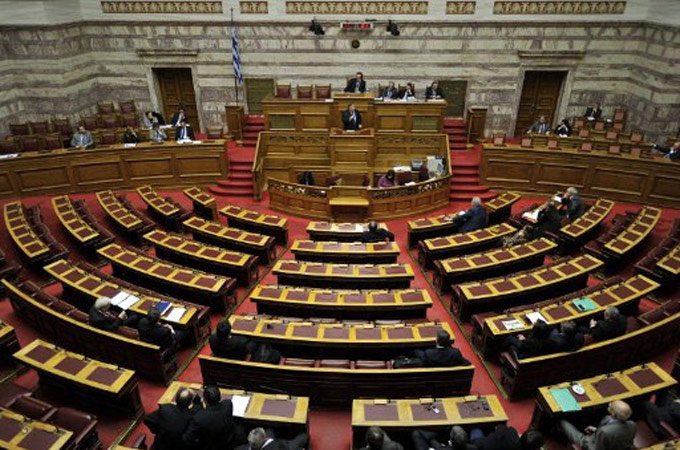Greek parliament approves debt-swap law
Legislators must now debate further austerity cuts required to get an additional $172bn in loans to avoid bankruptcy.

 |
| Legislators approved a law setting up procedures for debt restructuring with private creditors [AFP] |
The Greek parliament has approved a law on a $142bn debt deal with private creditors as the European Union warned that the country faced a much deeper recession than expected.
With the debt restructuring on track after the vote on Thursday, lawmakers now turn to legislation on the further austerity cuts and tough targets required to get an additional $172bn in loans by 2014.
Keep reading
list of 4 itemsBoeing hit with 32 whistleblower claims, as dead worker’s case reviewed
US imposes new sanctions on Iran after attack on Israel
A flash flood and a quiet sale highlight India’s Sikkim’s hydro problems
Evangelos Venizelos, the Greek finance minister, had pressed lawmakers to pass the legislation as debt deadlines loomed, charging that opponents were “unaware of the situation in which the country is”.
During a six-hour debate, Venizelos called for a show of Greek unity as a way to “regain our pride and the confidence of the markets”.
| In Depth | |||||||||||||||
|
The vote on the private sector debt restructuring was not in doubt as the two coalition government partners, the Socialists in PASOK and the conservative New Democracy party, have 193 of 300 seats in parliament.
Three leftist parties as well as the extreme right rejected the bill, saying it would “be profitable for banks and monopolies and not the
population”, according to the communist deputy Thanassis Pafilis.
But PASOK MP Christos Protopapas berated the opposition, saying that “ratification of the bill today is a matter of national duty; everything else
is populism”.
The high stakes for Greece in the make-or-break bailout got higher still on Thursday when the European Commission said its economy would shrink 4.4 per cent this year, much worse than its previous estimate of 2.8 per cent.
Many analysts believe that Greece simply cannot muster the growth needed to sustain its debt burden even after the latest bailout, seeing the accord as simply delaying an inevitable default.
Eurozone talks Tuesday set down a series of conditions that Greece must meet by February 29 in return for the $173bn in loans coupled with a 53.5 per cent loss of privately-held Greek sovereign bonds to slash $142bn from its debt mountain of $467.
In Brussels, EU officials said eurozone finance ministers will meet on March 1 to assess Greece’s readiness for the programme, needed after a $146bn deal agreed in May 2010 proved not to be enough.
The government hopes that at least 66 per cent of private creditors will sign up to the bond swap deal, allowing Athens to impose a collective action clause to force hold-outs to accept losses as well.
Austerity measures
Venizelos said an official offer to private creditors must be made by Friday so the debt swap can be concluded by March 12 on a first set of bonds.
Otherwise, “Greece will face a problem with its reserves on March 14” when it must repay debt of nearly $19.3bn, the finance minister warned.
Greece, stuck in recession for five years and with unemployment above 20 per cent and rising, has had to revise up its public deficit targets for this year to 6.7 per cent from 5.4 per cent of gross domestic product.
The much deeper-than-expected recession now forecast by Brussels could make that revised target even harder to meet, taking Greece further off course.
The parliamentary vote comes a day after unions staged fresh protests in the capital and Greece’s second city Thessaloniki against the additional austerity measures required under the package.
‘National reconstruction’
On Thursday, hospital workers called a strike in protest at healthcare cuts of some one billion euros this year which are due to be voted on Wednesday.
Parliament must now debate billions in spending cuts that have to be approved by next Thursday at the latest.
The austerity measures have to be in place before elections expected in April which pollsters say could fail to produce a clear majority, further clouding prospects for implementation of the debt accord.
Venizelos said during the debate that “Greece has now got a window of opportunity. We must take advantage of it.
“We must not repeat mistakes, we must not have any delays and we should not have ambivalence. We must implement the programme and turn it with our national additions into a complete national reconstruction plan.”